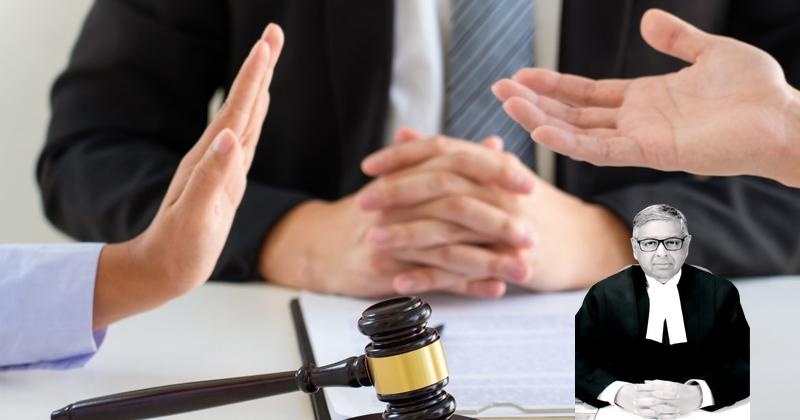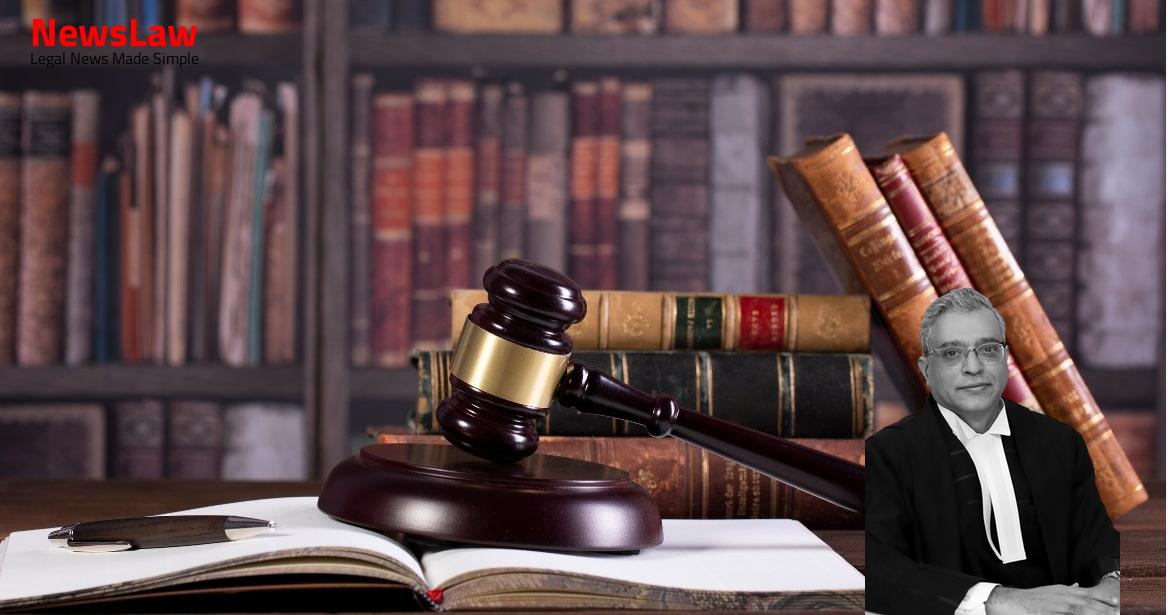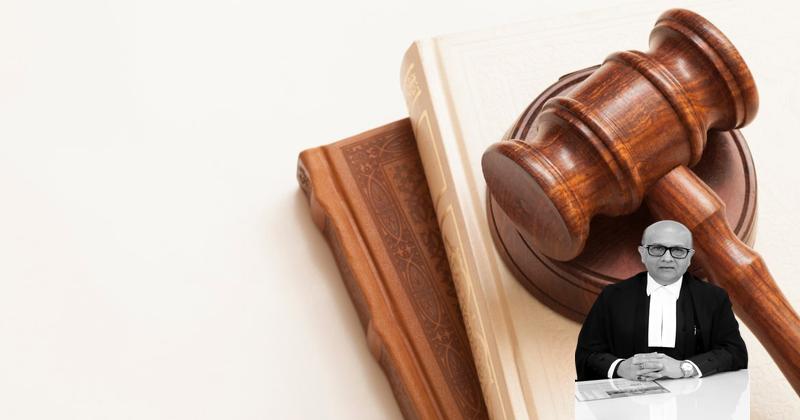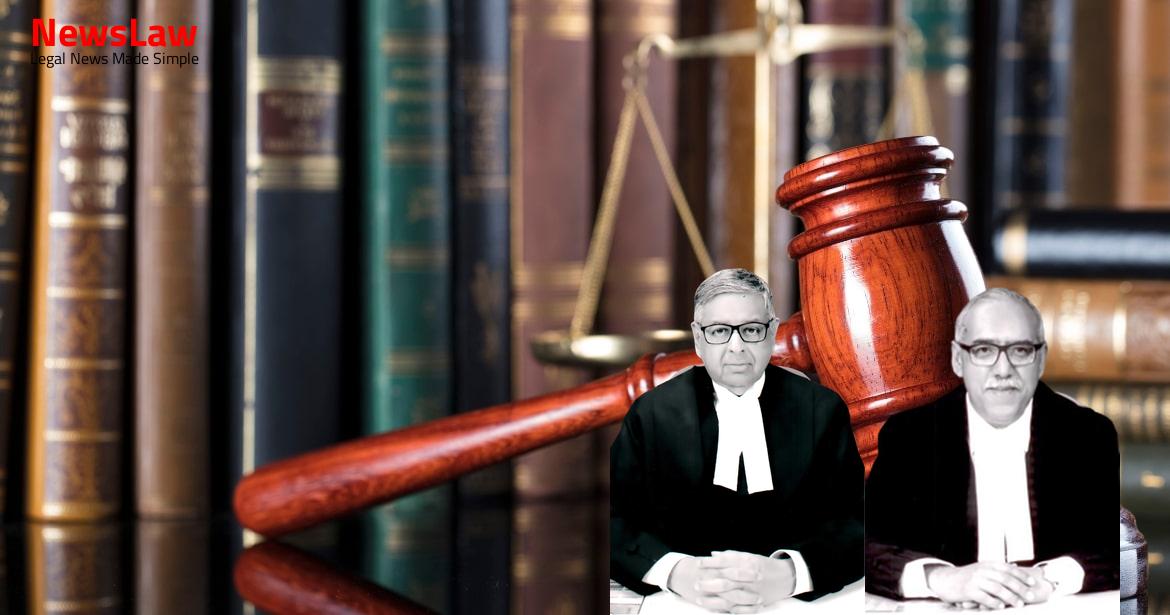A First Information Report dated 09.12.2021 was lodged with CID Police Station, Andhra Pradesh, Mangalagiri implicating twenty-six persons as accused. The list of accused persons was subsequently expanded and the appellant was also arraigned as an accused by an “Accused Adding Memo” dated 08.09.2021 lodged before the Special Judge, SPE & ACB cases (hereinafter referred to as “the Special Judge”). No.47 dated 10.09.2014 (referred to as 13.12.2014 in the order of the Special Judge dated 10.09.2023) issued by the Higher Education (EC A2) Department.
Government contribution was limited to 10 percent of the cost amounting to Rs.55,00,00,000/-, with SIEMENS and Design Tech providing grant-in-aid of 90% i.e., Rs.491,84,18,908/-.
The complaint of the taxing body was that SIEMENS and Design Tech had subcontracted substantial part of their work to Skillar despite there being no provision of any sub-contract in the Agreement. It appears that an in-depth scrutiny by the tax authorities showed that the concerned software including various sub-modules purported to have been supplied by Skillar to Design Tech was purchased by Skillar from different companies.
As per the investigating authorities a sum of Rs.370/- crores from the government funds of the APSSDC has been siphoned off.
It is recorded in the impugned judgement that the Andhra Pradesh Cabinet headed by the appellant at the instance of the accused no.1 had approved sanction of a budget of Rs.370/- crores towards 10% contribution of the government in the project and G.O.Ms. These allegations, inter-alia, are to the following effect: – “….A-37 by abusing his (A-37) official position, fraudulently committed criminal breach of trust with a common intention, caused wrongful loss to the Government exchequer by allowing accused and others to divert APSSDC funds by using fake invoices as genuine one for purpose of cheating through the shell, defunct companies without providing materials/services to the APSSDC-Siemens project.” On behalf of the appellant, the main argument, which was also made before the High Court, revolves around non- compliance of Section 17A of the Prevention of Corruption Act, 1988 in implicating the appellant under Sections 12, 13(2) read with 13(1) (c) and (d) of the 1988 Act and proceeding against him inter-alia, under the aforesaid provisions. It is also the appellant’s case that once fault is found with implicating the appellant under the aforesaid provisions of the 1988 Act, the entire proceeding qua the appellant before the Special Judge would also collapse because in such a case the Special Judge under the PC Act would have had acted beyond his jurisdiction and the remand order would become non-est. Provided further that the concerned authority shall convey its decision under this section within a period of three months, which may, for reasons to be recorded in writing by such authority, be extended by a further period of one month.” The High Court, inter-alia, held that the said provision cannot be applied to any offence committed prior to 26.07.2018. I quote below the redacted version of the said letter:- “ Office of the Director General Anti-Corruption Bureau, Andhra Pradesh, Vijayawada Rc No.10/RE-CIU/2018 Dated:5-6-2018 MEMORANDUM Sub:- Public Servants-Industries Department-Allegations of corruption against the officials of A.P. -Sd/- For Director General, Anti-Corruption Bureau, A.P., Vijayawada To: Sri Narra Venkateswara Rao, DSP, CIU, ACB, Vijayawada.” The High Court has accepted the argument of the State that a regular enquiry was ordered on 05.06.2018 regarding the allegations of corruption against the officials of APSSDC by the DG Anti-Corruption Bureau AP before Section 17A of the 1988 Act came into operation i.e.
The first suggestion of any active enquiry can be seen in a letter of 22.02.2021 originating from the Deputy Superintendent of Police, Anti-Corruption Bureau of that State, which states that the bureau is investigating a regular enquiry pertaining to allegations of corruption, misappropriation of funds and procedural lapses in relation to collaboration of APSSDC/AP Government with Design Tech.
Even though reference is made to the letter of 05.06.2018 in this communication, there are no specific particulars of such enquiry or the date on which such enquiry was started. But if otherwise no enquiry was started because of such alleged wrong, this time gap cannot be treated to have caused the date of issue of the letter of 05.06.2018 to be starting point of an enquiry, in the nature contemplated in Section 17A of the 1988 Act. “Inquiry” is defined in Section 2 (g) of the 1973 and implies inquiry conducted under the Code by a Magistrate or Court.
But if such allegations are assumed to be correct, the same shall only support the appellant’s case that no enquiry was initiated before incorporation of Section 17A in the statute book. Clause 4.2 thereof stipulates: – “Enquiry for the purposes of these SOPs, means any action taken, for verifying as to whether the information pertains to commission of offence under the Act.” As there is no authoritative guideline defining what constitutes an enquiry, I find it safe to rely on the explanation given in the aforesaid clause of the SOP. & Others [(1997) 5 SCC 326] and State of Uttar Pradesh -vs- Paras Nath Singh [(2009) 6 SCC 372], has held that the protection of sanction sought by the accused persons therein cannot be applied because when a public servant is alleged to have committed the offence of fabrication of records or misappropriation of public funds, it cannot be said that he acted in discharge of his official duty. In that context, it was held by a Coordinate Bench of this Court that looking at the nature of allegations in the complaint, at that stage it was impossible to conclude that the acts alleged to have been done by the accused were committed by her while in discharge of official duty. Matajog Dobey (supra), the resistor, contended that use of such force was not in discharge of official duty. also states that the question must be determined with reference to the nature of the allegations made against the public servant in the criminal proceeding. refers (at P-179) to the prosecution case as disclosed by the complaint or the police report and he winds up the discussion in these words:“Of course, if the case as put forward fails or the defence establishes that the act purported to be done is in execution of duty, the proceedings will have to be dropped and the complaint dismissed on that ground”. Where a power is conferred or a duty imposed by statute or otherwise, and there is nothing said expressly inhibiting the exercise of the power or the performance of the duty by any limitations or restrictions, it is reasonable to hold that it carries with it the power of doing all such acts or employing such means as are reasonably necessary for such execution.
Unlike Section 197 of 1973 Code (which is near identically phrased as the same section in the earlier version of the Code), Section17A of the 1988 Act imposes restriction on police officer at the enquiry stage itself, from proceeding against a public servant in relation to any offence alleged to have been committed by him, relatable to any recommendation made or decision taken by such public servant ( emphasis added), without previous approval of the authorities stipulated in the said Section. Under the provisions of Section 17A of the 1988 Act, there is no scope of judicial application of mind in determining if the flaw in making recommendation or taking decision is interwoven with discharge of official duty or function or not. Mansoori (supra), in which the offences involved, by their very nature, were prima facie not relatable to discharge of official duty by the accused, here the appellant’s actions relate to making recommendations or taking decisions and these decisions and recommendations otherwise, prima face, relate to discharge of official functions. State (NCT of Delhi), (2020) 2 SCC 88 : (2020) 1 SCC (Cri) 545 : (2020) 1 SCC (L&S) 146], this Court has held that if an investigation was not conducted by a police officer of the requisite rank and status required under Section 17 of the Act, such lapse would be an irregularity, however unless such irregularity results in causing prejudice, conviction will not be vitiated or be bad in law. I have already referred to Section 19 of the 1988 Act which requires the Court to satisfy itself whether such sanction stated therein has been taken at the stage of taking cognizance. Section 17A does not distinguish between alleged commission of offence prior to 26.07.2018 or post thereof.
In the case of Tejmal Choudhary (supra) the FIR was registered on 01-01-2018 and the accused public servant sought quashing of the FIR on the ground of introduction of Section 17A in the 1988 Act. At the time the memorandum of adding the appellant as accused was issued, the said Amendment Act had become operational, but at the time of alleged commission of offence, aforesaid two sub-clauses were part of the statute book. Thus, if the process of enquiry commences at a time attracting specific provisions of the 1988 Act which stand deleted by the Amendment Act of 2018, the restrictive protection in form of Section 17A ought to be granted.
The question as to whether the phrase “under this Act” used in Section 17A of the 1988 Act, would mean to be “the Act”, as it existed at the time of alleged commission of offence or “the Act” as it stood post amendment when the enquiry commenced would also have to be answered by this Court. But I cannot give a restrictive interpretation to the expression “under this Act” to give an isolated retrospective operation to the said phrase, detaching it from rest of the provisions of Section 17A of the Act and remove the protective shield in a situation where an enquiry has started after introduction of the said provision but relates to an offence committed prior to its introduction in 2018. —(1) Notwithstanding anything contained in the Code of Criminal Procedure, 1973 (2 of 1974), or in any other law for the time being in force, the offences specified in sub-section (1) of section 3 shall be tried by special Judges only. (3) When trying any case, a special Judge may also try any offence, other than an offence specified in section 3, with which the accused may, under the Code of Criminal Procedure, 1973 (2 of 1974), be charged at the same trial. “under this Act” as contained in Section 3 (1) (a) would also have to be read to mean as “the Act” prevailing at the point of time the appellant’s case is brought to the Special Judge.
In the case of Yashwant Sinha and Others -vs- Central Bureau of Investigation through its Director and Another [(2020) 2 SCC 338], a Bench of this Court comprising of three Hon’ble Judges, while dealing with power of review had also examined this question.
No police officer shall conduct any enquiry or inquiry or investigation into any offence alleged to have been committed by a public servant under this Act, where the alleged offence is relatable to any recommendation made or decision taken by such public servant in discharge of his official functions or duties, without the previous approval — (a) in the case of a person who is or was employed, at the time when the offence was alleged to have been committed, in connection with the affairs of the Union, of that Government; (b) in the case of a person who is or was employed, at the time when the offence was alleged to have been committed, in connection with the affairs of a State, of that Government; (c) in the case of any other person, of the authority competent to remove him from his office, at the time when the offence was alleged to have been committed: Provided that no such approval shall be necessary for cases involving arrest of a person on the spot on the charge of accepting or attempting to accept any undue advantage for himself or for any other person: Provided further that the concerned authority shall convey its decision under this section within a period of three months, which may, for reasons to be recorded in writing by such authority, be In terms of Section 17-A, no police officer is permitted to conduct any enquiry or inquiry or conduct investigation into any offence done by a public servant where the offence alleged is relatable to any recommendation made or decision taken by the public servant in discharge of his public functions without previous approval, inter alia, of the authority competent to remove the public servant from his office at the time when the offence was alleged to have been committed. We realise that your hands are tied in this matter, but we request you to at least take the first step, of seeking permission of the Government under Section 17-A of the Prevention of Corruption Act for investigating this offence and under which, “the concerned authority shall convey its decision under this section within a period of three months, which may, for reasons to be recorded in writing by such authority, be extended by a further period of one month”.”
Therefore, the petitioners have filed the complaint fully knowing that Section 17-A constituted a bar to any inquiry or enquiry or investigation unless there was previous approval. The ratio of this decision would not apply in the context of the judgment delivered in the case of Yashwant Sinha (supra), as in the latter authority the majority view does not reflect any discord over the concurring view. Hence this principle of law contained in the concurring judgment would constitute precedent even though it was expressed in a concurring judgment of a learned Single Judge which the majority members of the Bench have not differed. Further, in the case of Mahmood Ali & others -vs- State of UP [2023 INSC 684] a Coordinate Bench of this Court has observed :- “13….. The question of lack of prior approval under the 1988 Act was raised before the Special Judge at the time of remand but this argument was rejected on the ground that time for commission of the alleged offences related to a period prior to 26.07.2018.
I am not satisfied, at this stage, that the 1988 Act offences are so dominant in the set of allegations against the appellant that once I consider the allegations against the appellant de hors the alleged offences under 1988 Act, the allegations of commission of the IPC offences would automatically collapse. It is true that this may be an offence under the Arms Act also but the basic material for constituting an offence both under the Arms Act and the TADA Act is identical i.e. In the case of State through Central Bureau of Investigation, New Delhi -vs- Jitender Kumar Singh [(2014) 11 SCC 724] certain persons who were not public servants were being tried with a public servant in relation to offences outside the purview of the 1988 Act. In the instant case, since no PC offence has been committed by any of the non-public servants and no charges have been framed against the public servant, while he was alive, the Special Judge had no occasion to try any case against any of them under the PC Act, since no charge has been framed prior to the death of the public servant. Consequently, we find no error in the view taken by the Special Judge, CBI, Greater Mumbai in forwarding the case papers of Special Case No 88 of 2001 in the Court of the Chief Metropolitan Magistrate for trying the case in accordance with law.
In Section 4(3) of the 1988 Act it has been stipulated that when trying any case, a Special Judge may also try any offence other than an offence specified in Section 3, with which the accused may be charged with under the 1973 Code, at the same trial. It has been submitted before us on behalf of the State that other co-accused persons have been implicated in offences under the 1988 Act. What persons may be charged jointly.—The following persons may be charged and tried together, namely:— (a) persons accused of the same offence committed in the course of the same transaction; (b) persons accused of an offence and persons accused of abetment of, or attempt to commit, such offence; (c) persons accused of more than one offence of the same kind, within the meaning of section 219 committed by them jointly within the period of twelve months; (d) persons accused of different offences committed in the course of the same transaction; (e) persons accused of an offence which includes theft, extortion, cheating, or criminal misappropriation, and persons accused of receiving or retaining, or assisting in the disposal or concealment of, property possession of which is alleged to have been transferred by any such offence committed by the first-named persons, or of abetment of or attempting to commit any such last named offence; (f) persons accused of offences under sections 411 and 414 of the Indian Penal Code (45 of 1860) or either of those sections in respect of stolen property the possession of which has been transferred by one offence; (g) persons accused of any offence under Chapter XII of the Indian Penal [if he or it is satisfied] that such persons would not be prejudicially affected thereby, and it is expedient so to do, try all such persons together.” Sub clause (a) of the aforesaid provision of the 1973 Code, so far as charging and trying of an accused is concerned, could apply in the present case, as the non-obstante clause with which Section 4 of the 1988 Act is couched, would not oust the principles contained in Section 223 of the 1973. This is because the co-accused of the appellant who have been also charged of offences specified in Section 3 of the Act must be tried by the Special Judge, who in view of the provisions of sub-section (3) of Section 4 and Section 220 of the Code may also try them of the charge under Section 120-B read with Section 420 IPC. Otherwise it appears rather incongruous that some of the conspirators charged of having committed the same offence may be tried by the Special Judge while the remaining conspirators who are also charged of the same offence will be tried by another court, because they are not charged of any offence specified in Section 3 of the Act.” A question has also been raised by the appellant as to whether the Special Judge could have passed the remand order in the event the remand was asked for only in respect of alleged commission of the IPC offences. I, accordingly, dispose of this appeal with the following directions:- (i) If an enquiry, inquiry or investigation is intended in respect of a public servant on the allegation of commission of offence under the 1988 Act after Section 17A thereof becomes operational, which is relatable to any recommendation made or decision taken, at least prima facie, in discharge of his official duty, previous approval of the authority postulated in sub-section (a) or (b) or (c) of Section 17A of the 1988 Act shall have to be obtained.
A question has also been raised by the appellant as to whether the Special Judge could have passed the remand order in the event the remand was asked for only in respect of alleged commission of the IPC offences. We are apprised in course of hearing that the appellant has been enlarged on bail. Hence, this question need not be addressed by me in this judgment. I, accordingly, dispose of this appeal with the following directions:
(i) If an enquiry, inquiry or investigation is intended in respect of a public servant on the allegation of commission of offence under the 1988 Act after Section 17A thereof becomes operational, which is relatable to any recommendation made or decision taken, at least prima facie, in discharge of his official duty, previous approval of the authority postulated in subsection (a) or (b) or (c) of Section 17A of the 1988 Act shall have to be obtained. In absence of such previous approval, the action initiated under the 1988 Act shall be held illegal.
(ii) The appellant cannot be proceeded against for offences under the Prevention of Corruption Act, 1988 as no previous approval of the appropriate authority has been obtained. This opinion of this Court, however, shall not foreclose the option of the concerned authority in seeking approval in terms of the aforesaid provision. In this case, liberty is preserved for the State to apply for such approval as contained in the said provision.
(iii) I decline to interfere with the remand order dated 10.09.2023 as I am of the view that the Special Judge had the jurisdiction to pass such order even if the offences under the 1988 Act could not be invoked at that stage. Lack of approval in terms of Section 17A would not have rendered the entire order of remand nonest.
(iv) The appellant, however, could be proceeded against before the Special Judge for allegations of commission of offences under the Indian Penal Code, 1860 for which also he has been implicated.
The appeal stands partly allowed, in the above terms. All connected applications stand disposed of.
Case Title: NARA CHANDRABABU NAIDU Vs. THE STATE OF ANDHRA PRADESH (2024 INSC 41)
Case Number: Crl.A. No.-000279-000279 / 2024



